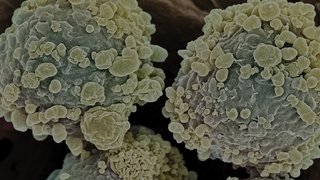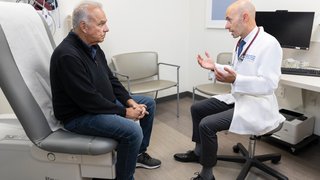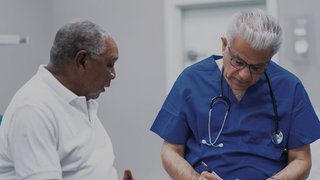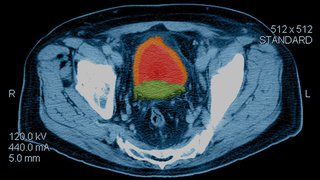Integrating Basic Science with Clinical Practice
April 29, 2021
Cancer Answers Online
Dive deeper into the breakthroughs and discoveries happening at Simmons Cancer Center.
UT Southwestern’s Chief of Hematology and Oncology has a long-standing history of pioneering breakthroughs in basic cancer research, while concurrently mentoring strong clinical and academic leaders, emphasizing the application of basic science discoveries to clinical practice.
When Suzanne Conzen, M.D., arrived at UT Southwestern Harold C. Simmons Comprehensive Cancer Center, she came with a focused mission: to build a strong academic research-focused and patient-oriented Division of Hematology and Oncology that applies groundbreaking science to patient care.
“Thanks to UTSW’s strong spirit of collaboration, along with a renewed emphasis on basic and clinical scientific training and mentoring junior faculty members, the Division is well on track to accomplishing this goal,” she says.
As a physician-scientist, Dr. Conzen says, her goal is to integrate laboratory inquiry with important clinical challenges that face patients.
“Seeing patients and their families benefit from our work is our most important goal,” she says. “When I first joined UTSW, the level of scientific and clinical expertise immediately impressed me. The faculty and trainees continue to ask important questions thereby pioneering highly innovative research. Creative thinking, combined with a passion for excellence, has the strongest potential to achieve meaningful discoveries for both the prevention and treatment of cancer. Ultimately, providing the highest quality of care for patients is what motivates all aspects of what our Division strives for.”
As Chief of the Division of Hematology and Oncology, strategic leadership is an increasingly important aspect of Dr. Conzen’s collaborative role with Simmons Cancer Center. As multidisciplinary teams throughout the institution continue to expand their world-class clinical and research programs, recruiting the best and brightest faculty, fellows and students is paramount.
“Part of my role is to contribute to long-term institutional strategy, and ultimately, take responsibility for the performance and progress of the Division as a whole,” she explains. A key component of her mission is to create and articulate a culture of transparency, communication, and continuous improvement among the scientific and clinical teams (including faculty, trainees, advanced practice providers and nurses).
“At the core, ensuring that we consistently provide high-quality, evidence-based, patient-centered care is essential to our success as an institution.”
Background and Education
Dr. Conzen earned her medical degree from Yale University School of Medicine and obtained a Master of Science from the University of London. She completed her residency in internal medicine at Cornell Medical Center’s New York Hospital and received advanced training in hematology and oncology at Dartmouth-Hitchcock Medical Center where she was awarded a Howard Hughes Medical Institute postdoctoral physician-scientist fellowship to perform basic science research in the Department of Biochemistry. Dr. Conzen also completed a second post-doctoral fellowship in Molecular Oncology at The University of Chicago’s Ben May Institute for Cancer Research.
Certified by the American Board of Internal Medicine in medical oncology, and an elected member of the Association of American Physicians (AAP), she joined the UT Southwestern faculty in 2019.
Research and Discoveries
In her laboratory, Dr. Conzen’s research focuses on how the body’s stress hormone sensor, the “glucocorticoid” (cortisol) receptor or GR, contributes in individual ways to the progression of prostate, breast, and ovarian cancers. Her previous research at the University of Chicago led to the recognition of a role for GR signaling in breast cancer biology and, more recently, in cancer progression and treatment-resistance in prostate and ovarian cancer.
“We are using both animal modeling and molecular approaches to study how the neuroendocrine stress response and, specifically, the mechanisms by which the stress hormone’s effector protein or GR can be modulated to alter cancer progression and sensitivity to therapy- including immunotherapy, radiation and other hormonal therapies,” she explains.
For example, in collaboration with colleagues at the University of Chicago, Dr. Conzen’s team defined GR activation in castration-resistant prostate cancer as a mechanism of cancer progression and pioneered work that brought GR antagonism into clinical trials. Alongside these discoveries, they have led several multidisciplinary projects, resulting in two Challenge Awards from the Prostate Cancer Foundation.
“I’m thrilled to continue my scientific, clinical and administrative work here at UT Southwestern, building upon its strong history of translating basic science to fundamental disease processes.”
Suzanne Conzen, M.D.
Dr. Conzen has also defined broader mechanisms of the mammalian physiological stress response in both cancer initiation and progression, leading to several novel hypotheses and further studies from her and other scientific groups concerning the relationship between environmental and societal stressors, resulting high glucocorticoid levels, and the risk of triple-negative breast cancer.
“Our research has shown that stress hormone changes in response to adverse environments can cause activation of downstream molecular pathways that impact both nascent cancer cells and their surrounding cells, such as immune cells,” she says. “This work also uncovered implications for how chronic stressors might play a role in increasing the risk for triple-negative breast cancer. Our laboratory’s goal is to develop an integrated understanding of the human stress response that includes gene expression at the cellular level, individual physiology to the stress response, and population genetics.”
Dr. Conzen’s research has also led to drug development in clinical trials for breast, prostate, pancreatic, and ovarian cancer. Currently, her team is developing a clinical trial to study a subset of triple-negative breast cancers that express both androgen and glucocorticoid receptors, which has been funded by the Breast Cancer Research Foundation.
Training the Next Generation of Scientists and Clinicians
Dr. Conzen is also pioneering efforts to form interdisciplinary mentoring for all junior faculty in her Division. As Assistant Director of Cancer Research Training and Education Coordination in the Simmons Cancer Center, she works with clinical program leaders to identify and prioritize areas for research development among clinical fellows, residents, and medical students. In this role, she strives to provide career enrichment activities for medical students, clinical fellows in oncology, clinical staff, and clinical junior faculty, and integrate cancer research mentoring and training of clinical biomedical scientists with health care professionals.
Looking Ahead
Over the next five years, Dr. Conzen plans to expand each of the UT Southwestern medical oncology and hematology programs, building upon the exceptional clinical expertise and scientific rigor already present within the Division.
“We will continue to provide and expand access to a wide range of clinical trials for our patients, with the potential to access investigational therapies otherwise not available in North Texas and beyond,” she says. “UT Southwestern Simmons Cancer Center strives to provide the best care for our patients and their families. As Chief of the Division, I’m committed to lead others to strive for major advances in cancer research and care.”








